Capitalism Means Free Markets... Free Markets Don't Necessarily Mean Capitalism
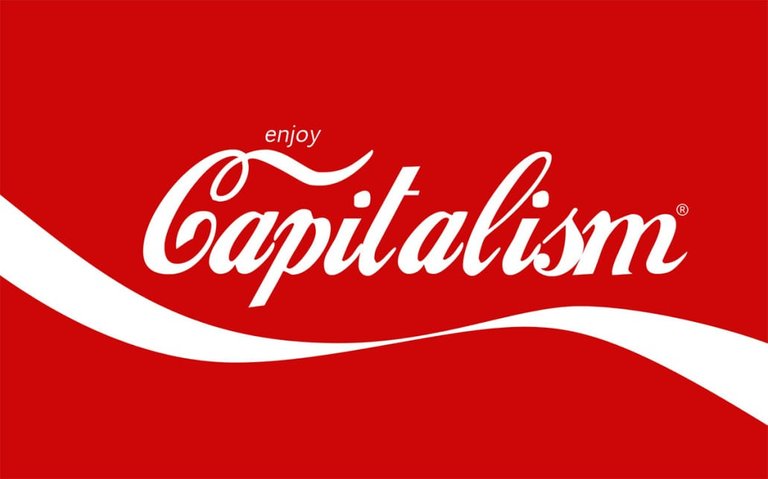
Introduction
Most of you will be familiar with the quote by John Kenneth Galbraith: "Under capitalism, man exploits man. Under communism, it's just the opposite." I believe that this understanding brings us closer to the real issue we're dealing with here. It is not simply a matter of what the logistical rules of the game are, it is MUCH more important how success/winning at the game is defined. It is MUCH more important what kind of behavior is rewarded by society, what is considered "normal", "right", and "good".
Currently (and for a LONG way back in Euro-American history), society has rewarded those who hoard as much as they can, those who lower the quality of their work in order to make it "cheaper", and those who achieve positions of power/authority/prestige over others. Is it any wonder that in a society that considers success to be power/fame/wealth that sociopaths & psychopaths flourish at the top?
All we really have to do is stop looking up to the people who put themselves first, who put profit over life, who put material gains over their own mental & emotional health. According to many studies (namely Park, Ward, Naragon-Gainey 2017), tying self-worth to money proves counter to well-being, and some of the biggest gains in "happiness" come from giving back to your community, family, and passions.
My goal here is synthesis: to take the ideas that already exist, set them aside, look at the bigger picture, and see what new & better ideas we can come up with now and moving forward. My focus is to expand the realm of possibilities for those who may think that our economic options are limited to simply capitalism or communism.
This is the "final" version of this document, which I have had printed, and will be bringing 200 copies of to Anarchapulco, besides some basic formatting differences, and the fact that my last section wouldn't fit within the STEEM blockchain's 65,000 character limit.
Table of Contents
- Dialectics Instead of Debates!
- What is Capitalism?
- Non-Capitalists Aren’t All Communists
- The Free Market of Free Market Economics
- Private Property vs Personal Property
- Does a Blood Cell Own Your Body?
- Conclusion
- PS: Note from Murray Rothbard
- PPS: Peter Joseph vs Capitalism
- Suggested Reading
Dialectics Instead of Debates!
We need dialectics, not debates, in our movement. I've started to harp on this point a bit recently, after Bret Weinstein, in his appearance on the Joe Rogan Experience, really hammered home the difference between the two, and the importance of using the correct one for one's purposes. Though his focus was not on the concept of debate vs. dialectic in the same way that it resonated with me, he made me really dig into the words for the first time.
Definition of debate:
- a discussion, as of a public question in an assembly, involving opposing viewpoints:
a debate in the Senate on farm price supports. - a formal contest in which the affirmative and negative sides of a proposition are advocated by opposing speakers.
- deliberation; consideration.
- Archaic strife; contention.
Etymology of debate:
Noun
- early 14c., "a quarrel, dispute, disagreement," from Old French debat; see debate (v.). Sense of "a formal dispute, a debating contest, interchange of arguments in a somewhat formal manner" is perhaps from early 15c.
Verb
- late 14c., "to quarrel, dispute," also "discuss, deliberate upon the pros and cons of," from Old French debatre (13c., Modern French débattre), originally "to fight," from de- "down, completely" (see de-) + batre "to beat," from Latin battuere "beat" (see batter (v.)).
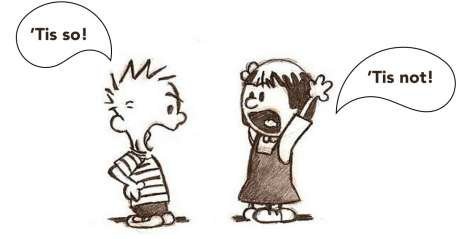
Definition of dialectic:
adjective, Also, dialectical
- of, relating to, or of the nature of logical argumentation.
- dialectal.
noun - the art or practice of logical discussion as employed in investigating the truth of a theory or opinion.
- logical argumentation.
- Often, dialectics.
a. logic or any of its branches.
b. any formal system of reasoning or thought. - Hegelian dialectic: an interpretive method, originally used to relate specific entities or events to the absolute idea, in which some assertible proposition (thesis) is necessarily opposed by an equally assertible and apparently contradictory proposition (antithesis) the mutual contradiction being reconciled on a higher level of truth by a third proposition (synthesis)
Etymology of dialectic:
1580s, earlier dialatik (late 14c.), from Old French dialectique (12c.), from Latin dialectica, from Greek dialektike (techne) "(art of) philosophical discussion or discourse," fem. of dialektikos "of conversation, discourse," from dialektos "discourse, conversation" (see dialect). Originally synonymous with logic; in modern philosophy refined by Kant, then by Hegel, who made it mean "process of resolving or merging contradictions in character."
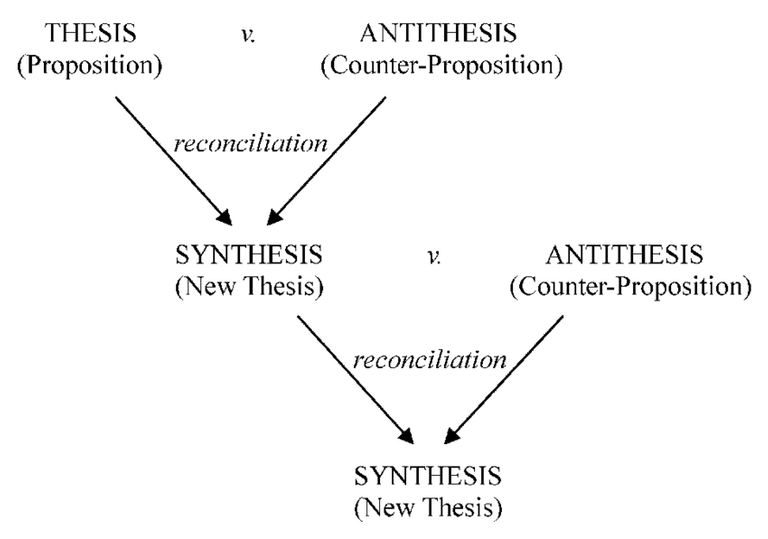
"Uh...huh... TL;DR Mr. Definitions"
Alright, so let's simplify that down to the basics of debate vs. dialectic:
Debate is two (or more) people coming together with opposing points/concepts/strategies, with each side attempting to prove themselves right, while proving the other wrong. It is a contest to find a winner and a loser, it is two folks attempting to dominate each other.
Dialectic is two (or more) people coming together with opposing points/concepts/strategies (thesis & antithesis), then using logic to come to a third point/concept/strategy, the synthesis. Rather than one side being "right" and the other side "wrong", both of the original ideas are ascended, and the two parties walk away with a new idea, which contains the best parts of both, and generally some new insights that neither party had before.
I know this whole breakdown may seem a bit semantic (though most philosophers love semantics), but I find it to be quite important because it completely re-frames our intentions around the discussion. Are we going into a discussion to see who's right and who's wrong, or are we trying to expand & increase the whole of human knowledge & insight? Are we cutting each other down or lifting everyone up?
What is Capitalism?
Let's look at what capitalism actually means, currently & historically:
- Definition from Merriam-Webster:
An economic system characterized by private or corporate ownership of capital goods, by investments that are determined by private decision, and by prices, production, and the distribution of goods that are determined mainly by competition in a free market - Definition from Oxford Dictionary:
An economic and political system in which a country's trade and industry are controlled by private owners for profit, rather than by the state. - Definition from Dictionary.com:
An economic system in which investment in and ownership of the means of production, distribution, and exchange of wealth is made and maintained chiefly by private individuals or corporations, especially as contrasted to cooperatively or state-owned means of wealth.
Etymology:
The term "capitalist", meaning an owner of capital, appears earlier than the term "capitalism" and it dates back to the mid-17th century. "Capitalism" is derived from capital, which evolved from capitale, a late Latin word based on caput, meaning "head" - also the origin of chattel and cattle in the sense of movable property (only much later to refer only to livestock). Capitale emerged in the 12th to 13th centuries in the sense of referring to funds, stock of merchandise, sum of money or money carrying interest. By 1283, it was used in the sense of the capital assets of a trading firm and it was frequently interchanged with a number of other words - wealth, money, funds, goods, assets, property and so on.
The Hollandische Mercurius uses capitalists in 1633 and 1654 to refer to owners of capital. In French, Étienne Clavier referred to capitalistes in 1788, six years before its first recorded English usage by Arthur Young in his work Travels in France (1792). In his Principles of Political Economy and Taxation (1817), David Ricardo referred to "the capitalist" many times. Samuel Taylor Coleridge, an English poet, used "capitalist" in his work Table Talk (1823). Pierre-Joseph Proudhon used the term "capitalist" in his first work, What is Property? (1840), to refer to the owners of capital. Benjamin Disraeli used the term "capitalist" in his 1845 work Sybil.
The initial usage of the term "capitalism" in its modern sense has been attributed to Louis Blanc in 1850 ("What I call 'capitalism' that is to say the appropriation of capital by some to the exclusion of others") and Pierre-Joseph Proudhon in 1861 ("Economic and social regime in which capital, the source of income, does not generally belong to those who make it work through their labour").
Karl Marx and Friedrich Engels referred to the "capitalistic system" and to the "capitalist mode of production" in Capital (1867). The use of the word "capitalism" in reference to an economic system appears twice in Volume I of Capital, p. 124 (German edition) and in Theories of Surplus Value, tome II, p. 493 (German edition). Marx did not extensively use the form capitalism, but instead those of capitalist and capitalist mode of production, which appear more than 2,600 times in the trilogy The Capital. According to the Oxford English Dictionary (OED), the term "capitalism" first appeared in English in 1854 in the novel The Newcomes by novelist William Makepeace Thackeray, where he meant "having ownership of capital". Also according to the OED, Carl Adolph Douai, a German-American socialist and abolitionist, used the phrase "private capitalism" in 1863.
Non-Capitalists Aren't All Communists
I often see & hear anarcho-capitalists referring to any anarchists who are not capitalists as "communists", and then ignoring anything they have to say.
Not only does this fly in the face of the history of anarchism (or libertarian socialism as it was most commonly known for the past few hundred years), but it also disregards the multitude of other economic systems. This labeling and subsequent dismissal is intellectually lazy at best, if not downright ignorant.
Personally, I don't identify with any labels, and I do what I can to help others top using that sort of limiting language as well. As Jiddu Krishnamurti put it:
When you call yourself an Indian or a Muslim or a Christian or a European, or anything else, you are being violent. Do you see why it is violent? Because you are separating yourself from the rest of mankind. When you separate yourself by belief, by nationality, by tradition, it breeds violence. So a man who is seeking to understand violence does not belong to any country, to any religion, to any political party or partial system; he is concerned with the total understanding of mankind.
This idea is especially important in the case of anarchists, as we find ourselves a (seeming) minority of humanity, working to bring awareness and empowerment to the whole planet. If we're already outnumbered, and then we go on to limit our numbers even more based on which adjectives we choose to identify with, we are not only limiting our own experience & learning, but we are doing an absolute disservice to the entire human race.
I'd like to introduce you to a few of my favorite historical anarchist philosophers with some of their thoughts on capitalism & communism:
Emma Goldman
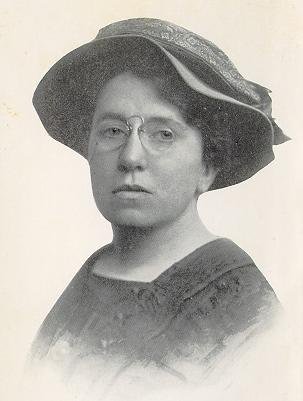
On communism:
"The dominant, almost general, idea of revolution — particularly the Socialist idea — is that revolution is a violent change of social conditions through which one social class, the working class, becomes dominant over another class, the capitalist class. It is the conception of a purely physical change, and as such it involves only political scene shifting and institutional rearrangements. Bourgeois dictatorship is replaced by the "dictatorship of the proletariat" — or by that of its "advance guard," the Communist Party. Lenin takes the seat of the Romanovs, the Imperial Cabinet is rechristened Soviet of People's Commissars, Trotsky is appointed Minister of War, and a labourer becomes the Military Governor General of Moscow. That is, in essence, the Bolshevik conception of revolution, as translated into actual practice."
"Our institutions and conditions rest upon deep-seated ideas. To change those conditions and at the same time leave the underlying ideas and values intact means only a superficial transformation, one that cannot be permanent or bring real betterment. It is a change of form only, not of substance, as so tragically proven by Russia."
"The sense of justice and equality, the love of liberty and of human brotherhood — these fundamentals of the real regeneration of society — the Communist State suppressed to the point of extermination. Man's instinctive sense of equity was branded as weak sentimentality; human dignity and liberty became a bourgeois superstition; the sanctity of life, which is the very essence of social reconstruction, was condemned as unrevolutionary, almost counter-revolutionary. This fearful perversion of fundamental values bore within itself the seed of destruction."
and on syndicalism:
"The fundamental difference between Syndicalism and the old trade union methods is this: while the old trade unions, without exception, move within the wage system and capitalism, recognizing the latter as inevitable, Syndicalism repudiates and condemns present industrial arrangements as unjust and criminal, and holds out no hope to the worker for lasting results from this system."
"Syndicalism is, in essence, the economic expression of Anarchism. That circumstance accounts for the presence of so many Anarchists in the Syndicalist movement. Like Anarchism, Syndicalism prepares the workers along direct economic lines, as conscious factors in the great struggles of to-day, as well as conscious factors in the task of reconstructing society along autonomous industrial lines, as against the paralyzing spirit of centralization with its bureaucratic machinery of corruption, inherent in all political parties."
Peter Kropotkin
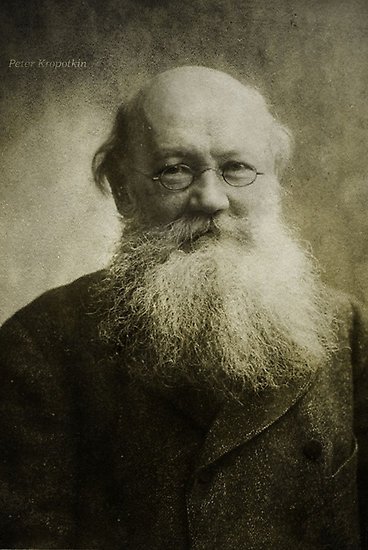
Kropotkin on private ownership:
"But a greater evil of the present system becomes more and more marked; namely, that in a system based on private appropriation, all that is necessary to life and to production — land, housing, food and tools — having once passed into the hands of a few, the production of necessities that would give well-being to all is continually hampered. The worker feels vaguely that our present technical power could give abundance to all, but he also perceives how the capitalistic system and the State hinder the conquest of this well-being in every way."
and on Mutual Aid:
"In primitive Buddhism, in primitive Christianity, in the writings of some of the Mussulman teachers, in the early movements of the Reform, and especially in the ethical and philosophical movements of the last century and of our own times, the total abandonment of the idea of revenge, or of "due reward" — of good for good and evil for evil — is affirmed more and more vigorously. The higher conception of "no revenge for wrongs," and of freely giving more than one expects to receive from his neighbours, is proclaimed as being the real principle of morality — a principle superior to mere equivalence, equity, or justice, and more conducive to happiness. And man is appealed to to be guided in his acts, not merely by love, which is always personal, or at the best tribal, but by the perception of his oneness with each human being. In the practice of mutual aid, which we can retrace to the earliest beginnings of evolution, we thus find the positive and undoubted origin of our ethical conceptions; and we can affirm that in the ethical progress of man, mutual support — not mutual struggle — has had the leading part. In its wide extension, even at the present time, we also see the best guarantee of a still loftier evolution of our race."
Benjamin Tucker
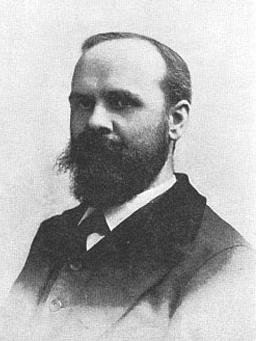
On Authoritarian/State Socialism:
"The two principles referred to are Authority and Liberty, and the names of the two schools of Socialistic thought which fully and unreservedly represent one or the other of them are, respectively, State Socialism and Anarchism. Whoso knows what these two schools want and how they propose to get it understands the Socialistic movement. For, just as it has been said that there is no half-way house between Rome and Reason, so it may be said that there is no half-way house between State Socialism and Anarchism."
on State Socialism:
"First, then, State Socialism, which may be described as the doctrine that all the affairs of men should be managed by the government, regardless of individual choice. Marx, its founder, concluded that the only way to abolish the class monopolies was to centralize and consolidate all industrial and commercial interests, all productive and distributive agencies, in one vast monopoly in the hands of the State. The government must become banker, manufacturer, farmer, carrier, and merchant, and in these capacities must suffer no competition. Land, tools, and all instruments of production must be wrested from individual hands, and made the property of the collectivity. To the individual can belong only the products to be consumed, not the means of producing them. A man may own his clothes and his food, but not the sewing-machine which makes his shirts or the spade which digs his potatoes. Product and capital are essentially different things; the former belongs to individuals, the latter to society. Society must seize the capital which belongs to it, by the ballot if it can, by revolution if it must. Once in possession of it, it must administer it on the majority principle, though its organ, the State, utilize it in production and distribution, fix all prices by the amount of labor involved, and employ the whole people in its workshops, farms, stores, etc. The nation must be transformed into a vast bureaucracy, and every individual into a State official. Everything must be done on the cost principle, the people having no motive to make a profit out of themselves. Individuals not being allowed to own capital, no one can employ another, or even himself. Every man will be a wage-receiver, and the State the only wage-payer. He who will not work for the State must starve, or, more likely, go to prison. All freedom of trade must disappear. Competition must be utterly wiped out. All industrial and commercial activity must be centered in one vast, enormous, all-inclusive monopoly. The remedy for monopolies is monopoly. Such is the economic programme of State Socialism as adopted from Karl Marx."
"What other applications this principle of Authority, once adopted in the economic sphere, will develop is very evident. It means the absolute control by the majority of all individual conduct. The right of such control is already admitted by the State Socialists, though they maintain that, as a matter of fact, the individual would be allowed a much larger liberty than he now enjoys. But he would only be allowed it; he could not claim it as his own. There would be no foundation of society upon a guaranteed equality of the largest possible liberty. Such liberty as might exist would exist by sufferance and could be taken away at any moment. Constitutional guarantees would be of no avail. There would be but one article in the constitution of a State Socialistic country: 'The right of the majority is absolute.'"
and on capitalism:
"labouring classes are deprived of their earnings by usury in its three forms, interest, rent and profit."
"Liberty will abolish interest; it will abolish profit; it will abolish monopolistic rent; it will abolish taxation; it will abolish the exploitation of labour; it will abolish all means whereby any labourer can be deprived of any of his product."
“in the case of land, or of any other material the supply of which is so limited that all cannot hold it in unlimited quantities, Anarchism undertakes to protect no titles except such as are based on actual occupancy and use.”
“Ground rent exists only because the State stands by to collect it and to protect land titles rooted in force or fraud. Otherwise land would be free to all, and no one could control more than he used.”
Mikhail Bakunin
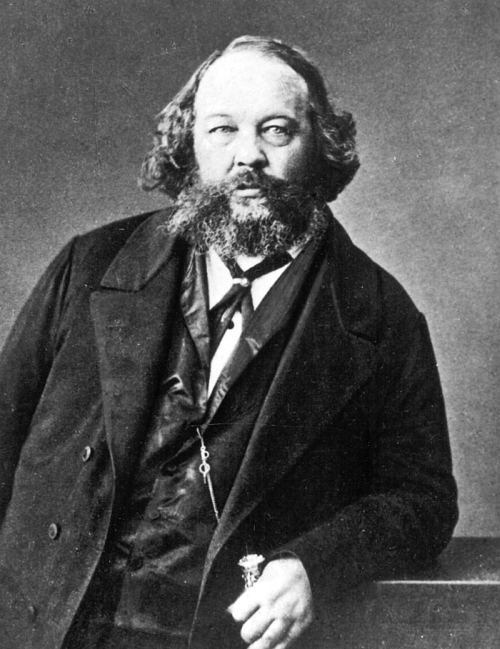
Of capitalism Mikhail Bakunin said:
"Yes, transitory and voluntary from the juridical point of view, but nowise from the point of view of economic possibility. The worker always has the right to leave his employer, but has he the means to do so? And if he does quit him, is it in order to lead a free existence, in which he will have no master but himself? No, he does it in order to sell himself to another employer. He is driven to it by the same hunger which forced him to sell himself to the first employer. Thus the worker's liberty, so much exalted by the economists, jurists, and bourgeois republicans, is only a theoretical freedom, lacking any means for its possible realization, and consequently it is only a fictitious liberty, an utter falsehood. The truth is that the whole life of the worker is simply a continuous and dismaying succession of terms of serfdom -voluntary from the juridical point of view but compulsory in the economic sense - broken up by momentarily brief interludes of freedom accompanied by starvation; in other words, it is real slavery."
"only associated labour, that is, labour organised upon the principles of reciprocity and co-operation, is adequate to the task of maintaining . . . civilised society."
and of Communism:
"I hate Communism because it is the negation of liberty and because humanity is for me unthinkable without liberty. I am not a Communist, because Communism concentrates and swallows up in itself for the benefit of the State all the forces of society, because it inevitably leads to the concentration of property in the hands of the State, whereas I want the abolition of the State, the final eradication of the principle of authority and the patronage proper to the State, which under the pretext of moralizing and civilizing men has hitherto only enslaved, persecuted, exploited and corrupted them. I want to see society and collective or social property organized from below upwards, by way of free association, not from above downwards, by means of any kind of authority whatsoever."
The Free Market of Free Market Economics
Many anarcho-capitalists say frequently that capitalism is simply free exchange, and nothing more. But since there are other, older, and less-misused terms which also mean free exchange (like simply saying free exchange), as well as multiple other economic models which include free exchange, why hold up this one word as the be-all, end-all of freedom?
Here are some other models, which certainly are not capitalist, and yet are in line with the parts of capitalism that most anarcho-capitalists seem to find most important: protecting your personal belongings, eliminating the state's monopoly on violence, and improving life for mankind via increased personal freedom.
None of these models include a centralized & violent group of humans (the State), none of them involve forceful redistribution of resources, and none of them involve anyone being above morality. These are just a few models I rather enjoy, though there are many others being put forth, including Open Source Economics, Anarcho-Syndicalism, a Natural Law Resource-Based Economy, Ubuntu, and so on.
Gift Economy
A gift economy is "a mode of exchange where valuables are not traded or sold, but rather given without an explicit agreement for immediate or future rewards." This model obviously includes an acceptance of "ownership" as how could anyone give away something that was not theirs? However, instead of being focused on quid-pro-quo, turning all human interactions into one party attempting to gain from the other, it is understood that material things are not of the highest value, and it is more rewarding, sustainable, and community-strengthening to simply give to others, rather than demanding or expecting some immediate return.
This model is also one of the few economic models which is in line with my metaphysical & energetic understanding of reality: that there is always enough, there is abundance.
The Earth provides everything humans need to survive & thrive, and what things are limited in one place will exist in excess in another.

From Charles Eisenstein, in Sacred Economics: Money, Gift, and Society in the Age of Transition:
To meet our unquantifiable needs, we need nonmonetary circulation. When the qualitative is matched with the quantitative, the infinite to the finite, then the former is debased. The exchange of beauty for money, intimacy for money, attention for money — all smell of prostitution. The distaste of the artist for the world of commerce is not just an egotism that says he is above it all. When money tries to buy beauty, love, knowledge, connection, and so forth, either the buyer receives a counterfeit, or the seller, having sold the infinitely precious for a finite sum, is exploited. It is really quite simple; as the Beatles put it, "Money can't buy you love."
That is why we need other ways for our gifts to circulate. The matter is complicated, though, by the fact that the quantifiable is often a vehicle for the unquantifiable. I am not advocating two separate realms, the monetary and the gift, but rather a mixed system in which money takes on more of the properties of gift and mediatory structures of gifting arise to take over the role of money.
Whether or not money is involved, the fundamental issues of economy - what people make and do for each other-are these: (1) how to connect the provider of a gift with the person who needs that gift; (2) how to acknowledge and honor those who give generously of their gifts; and (3) how to coordinate the gifts of many people across space and time in order to create things transcending the needs or gifts of any individual. Though it may not be obvious, these goals correspond roughly to the three cardinal functions of money: medium of exchange, unit of account, and store of value.
Many quasi-monetary and nonmonetary ways to achieve these three goals are emerging today. In the open-source software world, for example, P2P technologies allow a community of programmers to envision projects, coordinate talents, and recognize the contributions of its members, all without using money. In a way, the esteem of peers, based on the quality and quantity of previous contributions, is a form of "currency" that allows some members to exercise greater influence over group decisions than others. It is not quantified though; nor is it quantifiable without losing something of its essence. We can reduce esteem and prestige to a number, but let us recognize that this is in fact a reduction. Just as when analog recordings are rendered into digital formats, something of the warmth, humanity, and infinity of the original is lost.
From Genevieve Vaughan, in The Gift, Nurturance, and Human Emancipation:
The gift is transitive, other-oriented, mainly qualitative and it implies the value of the other, while exchange is ego oriented, self reflecting, quantitative and gives value to the objects exchanged and to the self. This simple distinction has not been made in these terms.
The unilateral gift has not been seen because it has seemed impractical, saintly or sacrificial and has been claimed as the province of morality and religion. Yet "free" is a mode of distribution and it begins in the womb and with the first intake of the free breath of life. The exchange of gifts that Marcel Mauss proposed is a three step process of giving, receiving and giving back. With young children this is not possible because they cannot give back an equivalent of what they have been given.
In fact the first and second step already constitute a gift and are at the core of all relationships. The mutuality and trust that are established between mother and child are the original human relational bond. The child can respond of course, but there is no obligatory repayment. The pattern is established and propagates by imitation rather than by obligation.
Unilateral gifting constitutes the original relational economy and it is within this economy that the interpersonal neurobiological developments in the brain happen in the first three years, before language, when the right hemisphere of the brain is dominant. The patterns involved are not at the level of consciousness for the child because they are originally non verbal.
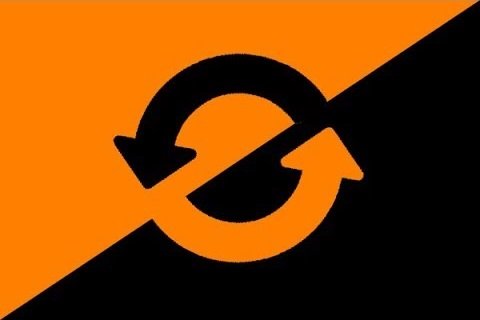
Mutualism
Mutualism is the idea that top-down authority should be abolished (both in corporations and in government) and in its place should be competing, worker-owned firms, direct democracy and communally-operated, profitless banks with low interest rates. It was developed by Pierre-Joseph Proudhon (the first person to call himself an anarchist) in the 1830s and 1840s, and was the first form of modern anarchism.
From Pierre-Joseph Proudhon:
This theory of Mutualism, that is to say of exchange in kind, of which the simplest form is the loan of articles of consumption is, when the collective being of society is regarded, a synthesis of the two ideas of appropriation and of communism; a synthesis as ancient as the elements of which it is composed, inasmuch as it is only a return of society to its primitive practices, across a labyrinth of inventions and systems, the result of six thousand years of meditation upon this fundamental proposition, A equals A.
From u/bigblindmax on Reddit:
Mutualism is an ethics system, based on reciprocity (the golden rule) and free association.
When taken to its logical conclusion, that set of ethics is expressed as a form of anarchism that seeks to abolish the state and private property. Instead of private property, we advocate for usufruct or use-based property rights. Anyone may homestead property by mixing their labor with it, but only if they're able and willing to actually use the property (rather than putting a factory there and having other people work for you). Abandoned or absentee property will return to the commons for anyone else to come along and use.
We differ from communists in the sense that we don't outright reject markets or using a medium of exchange like credit issued by a mutual bank. However, we are fundamentally opposed to any kind of centralized, state-issues currency.
We differ from Syndicalists and Communalists in the sense that we generally favor as little organization as possible. Mutualists therefore tend to put a greater emphasis on independent production, while seeing syndicalism as a necessary evil, to be used when the scale of production is too great to rely on cottage industry.
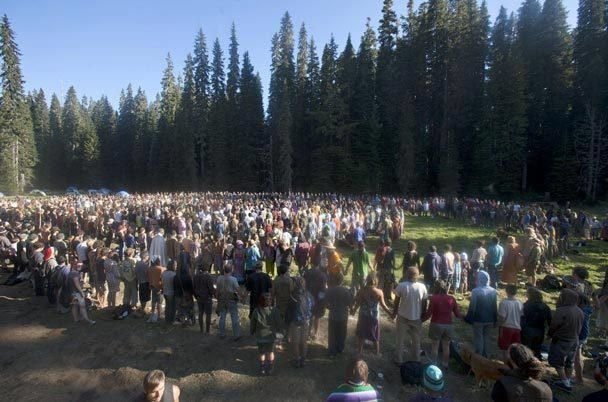
Rainbow Family
In the Rainbow, there is no profit incentive, all necessities of life (water, food, waste disposal) are handled communally (by whoever volunteers for any given project), and there is never the assumption that someone else has to give you something in return. It is a fusion of mutualism & a gift economy, and it is SO powerful to see that it is already in existence and functioning, made up of people who grew up (and spend most of their lives) in the "modern" world of states, corporations, and rampant greed.
My piece, The Rainbow Gathering: 5 Decades of Beta-Testing Anarchist Society, covers all the various facets of the gathering, including the lack of currencies involved, cooperative decentralized "camps", the gifting economy fused with barter, etc.
The Gathering is a completely free event, with no entry costs, no camping costs, no vendors, and no selling of food. The only time that you will ever see currencies at a Gathering is in the main circle, where the family comes together for dinner every evening, when people walk the circle with the "Magic Hat." 100% of donations to the Magic Hat are used for town runs to get food, lime, toilet paper, first aid supplies, etc. Food is given freely by any kitchen, instruments are loaned to those who wish to play, and extra supplies are shared with those in need.
Don't worry an-caps, this doesn't mean there is no trade at the Gathering! You can actually find a "Trade Circle" at any gathering, usually in a wide open field. People set out blankets, sheets, and rugs, displaying anything from handcrafted jewelry & artwork, to knives, Magic The Gathering cards, and anything else you can imagine. This is the true Agora, with people trading all sorts of things, from haggling over crystals to giving someone a painting that made their eyes light up in exchange for a hug. Here at Trade Circle, and anywhere else you want to barter with someone at Rainbow, the most common currencies are crystals, chocolate, and cannabis.
Private Property vs Personal Property
One of the biggest arguments I hear on this topic concerns the concept of private property. Capitalists put forth that property norms (agreements) are necessary to limit conflict. I can agree with that. They then go on to say that private property is the only possible property norm that could work. I would argue that as long as no force is being used, the style of property ownership used doesn't matter very much, and we should err in favor of the form that most limits the chance of hierarchy & centralization of power.
Definition of Private Property:
Private property is a legal designation for the ownership of property by non-governmental legal entities. Private property is distinguishable from public property, which is owned by a state entity; and from collective (or cooperative) property, which is owned by a group of non-governmental entities. Private property can be either personal property (consumption goods) or capital goods. Private property is a legal concept defined and enforced by a country's political system.
Definition of Personal Property:
Personal property is generally considered property that is movable, as opposed to real property or real estate. In common law systems, personal property may also be called chattels or personalty. In civil law systems, personal property is often called movable property or movables - any property that can be moved from one location to another.
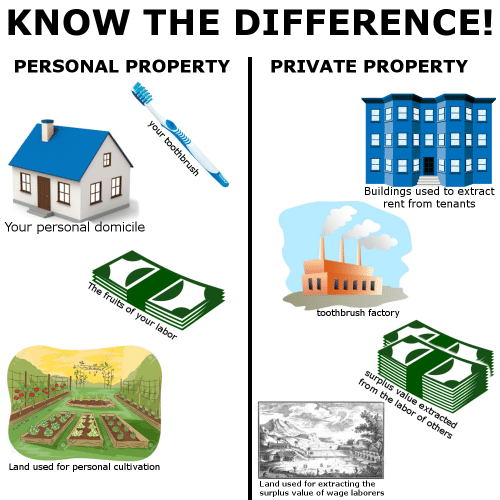
From infoshop.org:
Private property is one of the three things all anarchists oppose, alongside hierarchical authority and the state. Today, the dominant system of private property is capitalist in nature and, as such, anarchists tend to concentrate on this system and its property rights regime. We will be reflecting this here but do not, because of this, assume that anarchists consider other forms of private property regime (such as, say, feudalism) as acceptable. This is not the case — anarchists are against every form of property rights regime which results in the many working for the few.
Anarchist opposition to private property rests on two, related, arguments. These were summed up by Proudhon's maxims (from What is Property? that"property is theft" and "property is despotism." In his words, "Property . . . violates equality by the rights of exclusion and increase, and freedom by despotism . . . [and has] perfect identity with robbery." [Proudhon, What is Property, p. 251] Anarchists, therefore, oppose private property (i.e. capitalism) because it is a source of coercive, hierarchical authority as well as exploitation and, consequently, elite privilege and inequality. It is based on and produces inequality, in terms of both wealth and power.
[...]
[P]rivate property is the state writ small, with the property owner acting as the "sovereign lord" over their property, and so the absolute king of those who use it. As in any monarchy, the worker is the subject of the capitalist, having to follow their orders, laws and decisions while on their property. This, obviously, is the total denial of liberty (and dignity, we may note, as it is degrading to have to follow orders). And so private property (capitalism) necessarily excludes participation, influence, and control by those who use, but do not own, the means of life.It is, of course, true that private property provides a sphere of decision-making free from outside interference — but only for the property's owners. But for those who are not property owners the situation if radically different. In a system of exclusively private property does not guarantee them any such sphere of freedom. They have only the freedom to sell their liberty to those who do own private property. If I am evicted from one piece of private property, where can I go? Nowhere, unless another owner agrees to allow me access to their piece of private property. This means that everywhere I can stand is a place where I have no right to stand without permission and, as a consequence, I exist only by the sufferance of the property owning elite.
[...]
It will, of course, be objected that no one forces a worker to work for a given boss. However, as we discuss in section B.4.3, this assertion (while true) misses the point. While workers are not forced to work for a specific boss, they inevitably have to work for a boss. This is because there is literally no other way to survive — all other economic options have been taken from them by state coercion. The net effect is that the working class has little choice but to hire themselves out to those with property and, as a consequence, the labourer "has sold and surrendered his liberty" to the boss. [Proudhon, Op. Cit., p. 130]
[...]
Anarchists define "private property" (or just "property," for short) as state-protected monopolies of certain objects or privileges which are used to control and exploit others. "Possession," on the other hand, is ownership of things that are not used to exploit others (e.g. a car, a refrigerator, a toothbrush, etc.). Thus many things can be considered as either property or possessions depending on how they are used.To summarise, anarchists are in favour of the kind of property which "cannot be used to exploit another - those kinds of personal possessions which we accumulate from childhood and which become part of our lives." We are opposed to the kind of property "which can be used only to exploit people - land and buildings, instruments of production and distribution, raw materials and manufactured articles, money and capital." [Nicholas Walter, About Anarchism, p. 40]
[...]
While it may initially be confusing to make this distinction, it is very useful to understand the nature of capitalist society. Capitalists tend to use the word "property' to mean anything from a toothbrush to a transnational corporation - two very different things, with very different impacts upon society.
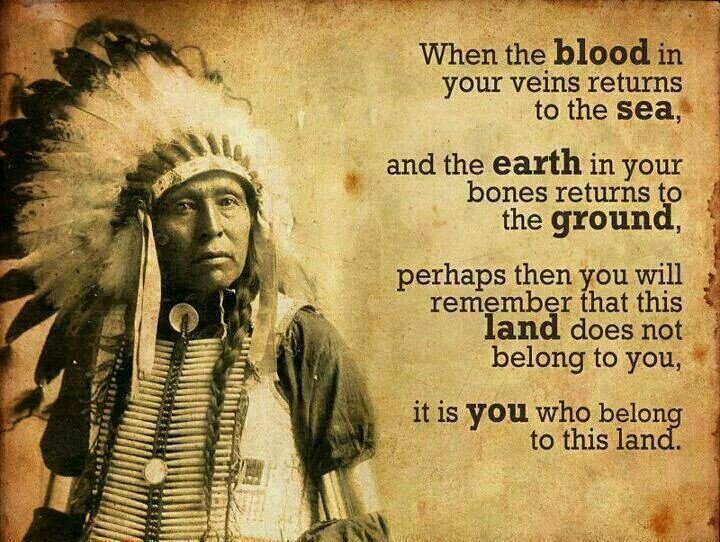
Does a Blood Cell Own Your Body?
Shifting back a bit again, I honestly find the very concept of land ownership to be completely laughable. You and I, as humans, are the creations of Earth and its systems. We are as cells in a larger organism, and to claim "ownership" over a piece of that organism is hubris to the extreme. Never mind the fact that the Earth could wipe out any one of us (or all of us) through a variety of means, we are by our very nature temporary blips in the history of this planet. That piece of land was there before humanity, and will be there after humanity; what can your ownership possibly mean, except use?
Capitalist land ownership concept
From Hoppe:
Everyone is the proper owner of his own physical body as well as of all places and nature-given goods that he occupies and puts to use by means of his body, provided only that no one else has already occupied or used the same places and goods before him. This ownership of "originally appropriated" places and goods by a person implies his right to use and transform these places and goods in any way he sees fit, provided only that he does not change thereby uninvitedly trainbhe physical integrity of places and goods originally appropriated by another person. In particular, once a place or good has been first appropriated by, in John Locke's phrase, 'mixing one's labor' with it, ownership in such places and goods can be acquired only by means of a voluntary - contractual - transfer of its property title from a previous to a later owner.
From Rothbard:
In a free society, any piece of nature that has never been used is unowned and is subject to a man's ownership through his first use or mixing of his labor with this resource.
This "cultivation" does not have to involve tilling the soil, although that is one possible form of cultivation. If the natural resource is land, he may clear it for a house or a pasture, or care for some plots of timber, etc. If there is more land than can be used by a limited labor supply, then the unused land must simply remain unowned until a first user arrives on the scene.
There is no requirement, however, that land continue to be used in order for it to continue to be a man's property. Suppose that Jones uses some new land, then finds it is unprofitable, and lets it fall into disuse. Or suppose that he clears new land and therefore obtains title to it, but then finds that it is no longer useful in production and allows it to remain idle. In a free society, would he lose title? No, for once his labor is mixed with the natural resource, it remains his owned land. His labor has been irretrievably mixed with the land, and the land is therefore his or his assigns' in perpetuity.

What is "unused" land?
These approaches to land, and the idea of owning it, are all based on the concept that the land was unused before a given human came upon it. I would argue that there is no such thing as unused land, and the idea that there is comes from a purely anthropocentric view of the universe.
Definition of anthropocentric: "Regarding humankind as the central or most important element of existence, especially as opposed to God or animals."
It is almost a certainty that the land is already in use by birds, mammals, insects, plants, fungus, and depending on the type of climate, any number of fish, reptiles, amphibians, etc. If a man builds a fence around his "property," keeping animals from getting to the food & water they depended on there, has no harm been done? If the trees which make home for various animals are chopped down, has no harm been done?
Let's assume for a moment that I do accept the human-centric view of the world. By these concepts of "original appropriation," the first group to get to a new island can simply move about the island, "mixing their labor" with it piece by piece, and thereby claiming the entire island (or any other given piece of land). If this constitutes permanent ownership, then what would be to stop someone (or a group of someones) from pooling their capital and hiring laborers to work massive swaths of land for them, thus cutting that land off from use by everyone else? What about when those owners die, and pass the land on to their children? What happens to the people whose parents didn't own land, when all the land is already owned? At some point, there would be no "unused" land left, and everyone who didn't already "own" some would have a massive hurdle to overcome in ever breaking through this ownership-based classism.
"Without property norms, there will be more conflict"
This is by far the most common argument that I've heard when this conversation comes up. What people are actually saying is that "if we do not have have agreements/standards for behavior, there will be more conflict." For the purpose of this conversation, let's assume that the foundation of this statement is true.
The argument that agreements are necessary does not logically lead to the conclusion that a specific agreement is the only possibility. If everyone agreed that everyone has the right to cultivate & build on any land that is not already being cultivated & built on, there would be agreement. If everyone agreed that all natural resources are "owned" in common by the people who live in the general area, there would be an agreement. As long as there is an agreement, conflict will be avoided, and there are any number of potential agreements that could be made. It's also important to remember that anarchy is never a top-down answer, which means that different societies, in different places, will have different agreements, different property norms, different economic models.
Key differences in understandings of the universe
No matter the topic being discussed, each person is only capable of discussing it from within their own understanding of the universe, how natural law functions, and how humans fit into the whole of life. When starting with totally different foundations, with a different view of the universe, it's pretty unrealistic to expect people to come to the same conclusions, even with the same epistemology.
From what I've been able to deduce, MANY anarchists (both left & right) tend to have atheistic, physical reductionist world-views. They do not believe in anything which cannot be measured & tested by our limited senses, they disregard the idea of an unseen, spiritual layer to the world, they see humans as the pinnacle of creation. Most philosophical & economic principles for these folks are already built on these assumptions, without any question or self-examination.
In my understanding, you and I, as humans, are the creations of Earth and its systems. We are as cells in a larger organism, and to claim "ownership" over a piece of that organism is hubris to the extreme. Never mind the fact that the Earth could wipe out any one of us (or all of us) through a variety of means, we are by our very nature temporary blips in the history of this planet.
That piece of land was there before humanity, and will be there after humanity; what can your ownership possibly mean, except use? Does a blood cell own your body, or any given limb? Does your lung own your abdomen? Does a tomato own the whole plant?
An alternative approach: land stewardship
We are all interconnected, both with each other and with the Earth itself. Whether we have chosen to believe in & operate on the concept of land ownership or not, if we do not act from a place of respect & care for the Earth and all her inhabitants, then we end up with a society which is actively destroying itself, its food sources, its air supply, and its water supply... Sound familiar?
"We abuse land because we regard it as a commodity belonging to us. When we see land as a community to which we belong, we may begin to use it with love and respect... That land is a community is the basic concept of ecology, but that land is to be loved and respected is an extension of ethics." - Aldo Leopold
Much of human society (especially following the Euro-American genocidal rampage across the planet) has been acting from a place of perceived superiority & disconnection from the rest of our planet. This illusion of separateness from our environment and from the billions of other life-forms that we share it with is the doorway to nihilism, and goes against the clear evidence that we are all connected.
According to Wendell Berry, author of The Unsettling of America: Culture and Agriculture, land stewardship is based on these rules:
- Using the land will lead to ruin of the land unless it "is properly cared for;
- If people do not know the land intimately, they cannot care for it properly;
- Motivation to care for the land cannot be provided by "general principles or by incentives that are merely economic;
- Motivation to care for the land, to live with it, stems from an interest in that land that "is direct, dependable, and permanent;
- Motivation to care for the land stems from an expectation that people will spend their entire lives on the land, and even more so if they expect their children and grandchildren to also spend their entire lives on that same land;and
- The ability to live carefully on the land is limited; owning too much acreage, for example, decreases the quality of attention needed to care for the land.
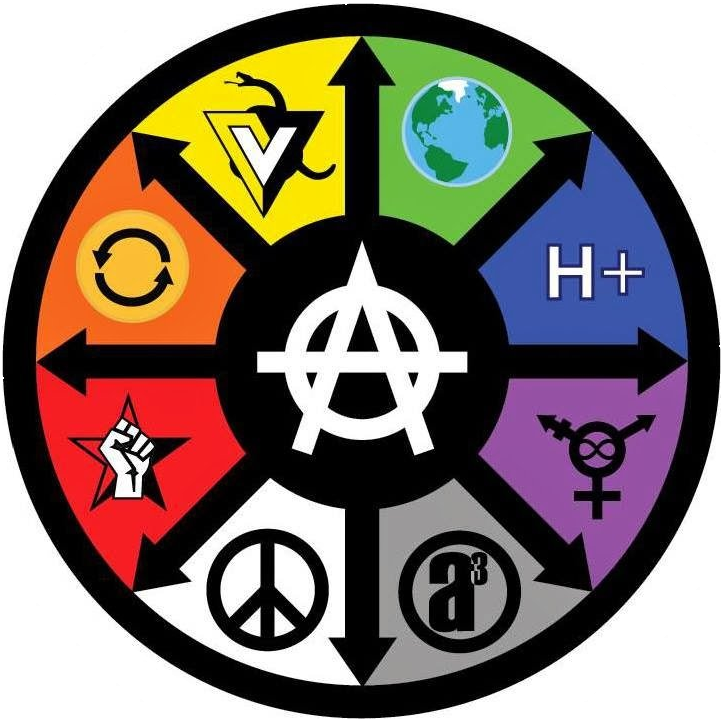
Conclusion
This essay is not intended to be anti-capitalist per se. My main purpose is to show how ripe & abundant the non-capitalist, non-communist realm of anarchy is in literature, history, and content in general. I want to offer a different angle on the discussion, to remind everyone that anarchy is just the foundation. Anything beyond that is basically just personal preference, should be up to the individuals to decide, and shouldn't really matter as long as we're still struggling to reach that foundation.
One point that I've often found rather entertaining when speaking to anarchists from either the -communist or -capitalist camps is the parroting of an identical, fallacious argument: Anarcho-communists claim that true communism has never been attempted, which anarcho-capitalists mock while simultaneously claiming that true capitalism has never been attempted, for the same reasons. To my mind, it is clear that no matter the attempted economic model, the existence of any entity(ies) with the right to initiate violence guarantees the corruption & failure of the society.
I hope this has proven an interesting thought experiment, and I hope that everyone reading remembers that beliefs that are limiting do not serve us. It is much more important that we have a way of determining truth, than that we believe that we hold truth. In this reality where we are so very limited (by our senses, our experiences, by our cognitive abilities, by time), it is quite foolhardy to close ourselves off to the unknown, to that which challenges our beliefs.
If one finds themself immediately disregarding everything coming from a particular political/social theory, especially without having already explored it, generally that means the person is too wrapped up in their own ideology. One of the main ways I keep myself from falling prey to that same trap has been to make sure I'm reading/listening to people from both ends of the spectrum in whatever realm I'm exploring at the time.
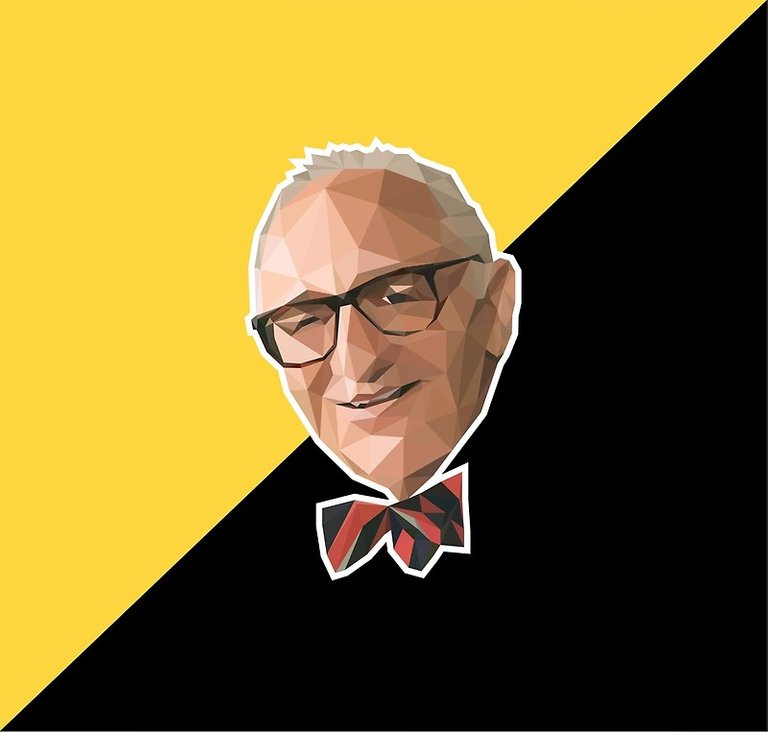
PS: Note from Murray Rothbard
In his "Betrayal of the American Right" Murray Rothbard speaks explicitly of the "capture" of the word libertarian:
One gratifying aspect of our rise to some prominence is that, for the first time in my memory, we, "our side," had captured a crucial word from the enemy. Other words, such as "liberal," had been originally identified with laissez-faire libertarians, but had been captured by left-wing statists, forcing us in the 1940s to call ourselves rather feebly "true" or "classical" liberals. "Libertarians," in contrast, had long been simply a polite word for left-wing anarchists, that is for anti-private property anarchists, either of the communist or syndicalist variety. But now we had taken it over, and more properly from the view of etymology; since we were proponents of individual liberty and therefore of the individual's right to his property. (p. 83)
Part of this statement is correct; the word ";libertarian" had always been synonymous with "anarchists," who until the 1900s had been pretty exclusively libertarian-socialists of one type or another.
He is mistaken, however, in making the assumption that private property rights & individual liberty are somehow synonymous. The many alternative free market systems I briefly explored above (and many more I didn't) all protect individual rights and do not involve any form of state or other institutional coercion.
He also wrote a piece in the periodical Faith & Freedom, in which he addressed the question "Are Libertarians 'Anarchists'?":
"We must therefore turn to history for enlightenment; here we find that none of the proclaimed anarchist groups correspond to the libertarian position... we find that all of the current anarchists are irrational collectivists, and therefore at opposite poles from our position. We must therefore conclude that we are not anarchists."
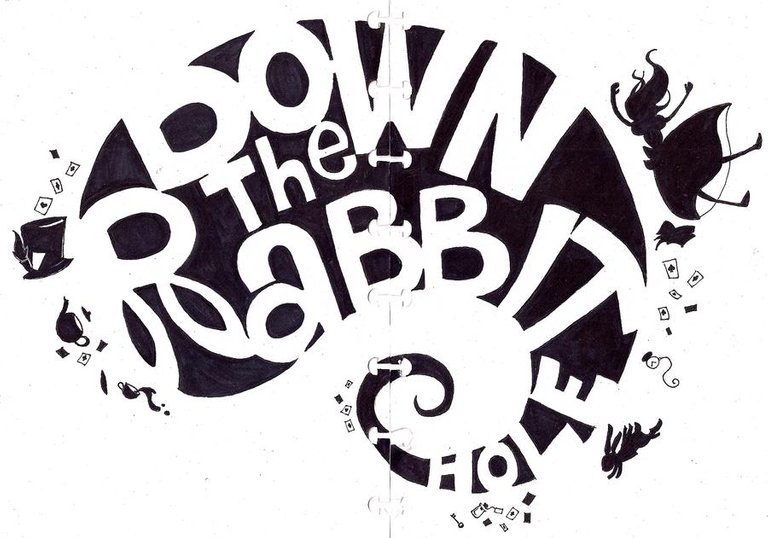
Suggested Reading
- Spend a few hundred hours digging through The Anarchist Library
- The Abolition of Work and other Essays by Bob Black
- An Agorist Primer by Samuel E. Konkin III
- The Best That Money Can't Buy: Beyond Politics, Poverty, & War by Jacque Fresco
- The Compassionate Species by Dacher Keltner
- The Conquest of Bread by Pyotr Kropotkin
- The Creature from Jekyll Island by G. Edward Griffin
- The Culture Series by Iain M. Banks (Science Fiction, depicting a galaxy-wide anarchist, moneyless, property-less society)
- Debt: The First 5,000 Years by David Graeber
- The Ego and Its Own by Max Stirner
- Free Will and Human Responsibility: A Philosophical Argument by Herman Harrell Horne
- The Gift Economy by David J. Cheal
- Markets Not Capitalism by by Gary Chartier & Charles Johnson
- Mutual Aid: A Factor of Evolution by Pyotr Kropotkin
- The New Human Rights Movement by Peter Joseph
- No More Throw-Away People by Edgar S. Cahn
- The People's History of the United States by Howard Zinn
- Post-Scarcity Anarchism by Murray Bookchin
- Sacred Economics: Money, Gift, and Society in the Age of Transition by Charles Eisenstein
- Studies in Mutualist Political Economy by Kevin A. Carson
- Ubuntu Contributionism - A Blueprint For Human Prosperity by Michael Tellinger
- The Unsettling of America: Culture and Agriculture by Wendell Berry
- Wealth of Nations by Adam Smith
- What is Property? by Benjamin R. Tucker
- What is Property? by Pierre-Joseph Proudhon
- The Zeitgeist Movement Defined by The TZM Lecture Team


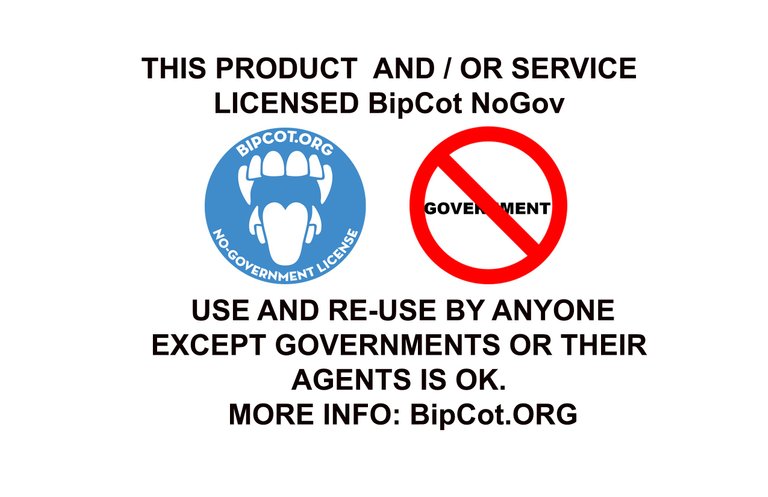
Curated for #informationwar (by @thoughts-in-time)
Ways you can help the @informationwar!
Excellent piece Kenny. The only thing I would add is the issue of scale which humanity faces today and most people within any of these camps seem to ignore this primary concern. This issue is why I suggest a civilizational 'time-out'...Emergency protocols aren't necessarily new but most often implemented when it's too late--War Measures Acts and such. We'll probably get there this century as WW3 is likely inevitable but I make the suggestion nevertheless.
In my Four Pillars of A New Earth Commons premised loosely on Mutualist Golden Rule ethics I suggest four areas which could be altered in an emergency situation: housing, food, education, and healthcare. These areas of human need (basic) should be funded by a new non-debt currency (non-usurious). In essence, it would lead to two juxtaposed civilizations: one a techno Neo-Shire with new homesteading laws and new guilds alongside a Star-Trekkian commercial culture. Likely a Pareto 80/20 world culture with as much choice (voluntaryism) as possible under emergency protocols. The trick would be to make the Commons Shire culture so cool and healthy that most would want to live within the steady-state economic model.
Will we get anything at all like this? NO! Why? Metaphysics! Look to Marcion of Sinope to who rules this place and why things can never be anything than what they are here: Archon rule of the Demiurge. This type of Gnostic view is also why Gnosticism, as mentioned here, is incommensurate with any type of capitalist system. I recently had this type of dispute with the OverWatch channel. A Gnostic channel arguing for Ancap...Not at all possible from the Gnostic camp I sit in.
I wanted to mention a fairly significant irony within the Gnostic camp I sit in. Although we view our situation here as entirely bleak we are also, at the same time, some of the most prominent voices for just economics and healthy living systems. This was true of the Cathars, too...
Thank you!
It's funny, I was just recently talking to a friend about how I feel like we need a new technology time-out right now. No more gene editing, weather manipulation, wireless technologies, etc. until we get to the point that there aren't a few people massively gaining from them while everyone else suffers. Is better communications tech a good idea? Yes. Is having governments and mega-corporations (neither of which gives a damn about life, health, freedom) in charge of these things a good idea? Obviously not.
Is your Four Pillars of a New Earth Commons something that's available to read? One of the many things I collect is that kind of foundational principles/guidelines/pillars/constitutions. Always working to synthesize them together more and more :-) Have you ever checked out the channel The Crimson Circle? They've got some really great talks, especially the ones with all three guys (all of whom are channelers), in which they often discuss the idea that humanity is going to effectively divide into 3 races (basically transhuman, ascendant human, and basic human)
For a long time I got tired of studying the different systems, and I understood, that the systems don't have a life of their own, the best of the systems would fail if the society is corrupted. On the other hand, current ideologies, highly materialistic, only serve while sustaining a material state, for example, without industry there can be no capitalism, socialism, or communism in the terms that we know today, it could be said that some of its principles could to be applied in a society without industry, but not the ideology itself. If tomorrow we reach another planet and our resources become infinite, and we get the machines to do our work, it would be foolish to maintain capitalism, in that case, communism would be better, on the other hand, at present, proposing communism would simply be ridiculous .
The ideologies are not those that form society, they are the people and the beliefs and virtues that they have.
Peace, Abundance, and Liberty Network (PALnet) Discord Channel. It's a completely public and open space to all members of the Steemit community who voluntarily choose to be there.Congratulations! This post has been upvoted from the communal account, @minnowsupport, by kennyskitchen from the Minnow Support Project. It's a witness project run by aggroed, ausbitbank, teamsteem, someguy123, neoxian, followbtcnews, and netuoso. The goal is to help Steemit grow by supporting Minnows. Please find us at the
If you would like to delegate to the Minnow Support Project you can do so by clicking on the following links: 50SP, 100SP, 250SP, 500SP, 1000SP, 5000SP.
Be sure to leave at least 50SP undelegated on your account.
Hi @kennyskitchen!
Your UA account score is currently 6.247 which ranks you at #232 across all Steem accounts.
Your rank has not changed in the last three days.Your post was upvoted by @steem-ua, new Steem dApp, using UserAuthority for algorithmic post curation!
In our last Algorithmic Curation Round, consisting of 207 contributions, your post is ranked at #81.
Evaluation of your UA score:
Feel free to join our @steem-ua Discord server